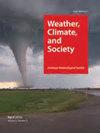Climate Change, Fish Production, and Maritime Piracy
IF 1.9
4区 地球科学
Q3 ENVIRONMENTAL STUDIES
引用次数: 0
Abstract
Contemporary social science has produced little research on connections between climate change and crime. Nonetheless, much prior research suggests that economic insecurity may affect individual calculations of the cost and benefit of engaging in criminal behavior, and climate change is likely to have important economic consequences for professions like fishing that depend directly on the environment. In this paper, we test the possibility that climate change affects participation in maritime piracy, depending on the specific ways that it impacts regional fish production. Our analysis is based on piracy in East Africa and the South China Sea. These two regions are strategic in that both areas have experienced a large amount of piracy; however, rising sea temperatures have been associated with declines in fish production in East Africa but increases in the South China Sea. We treat sea surface temperature as an instrument for fish output and find that in East Africa higher sea surface temperature is associated with declining fish production, which in turn increases the risk of piracy, whereas in the South China Sea higher sea surface temperature is associated with increasing fish production, which in turn decreases the risk of piracy. Our results also show that decreases in fish production bring about a larger number of successful piracy attacks in East Africa and that increases in fish production are associated with fewer successful attacks in the South China Sea. We discuss the theoretical and policy implications of the findings and point out that as climate change continues, its impact on specific crimes will likely be complex, with increases and decreases depending on context. There is little evidence on the effect of climate change on criminal behavior. This study seeks to quantify the impact of a specific type of climate change—rising sea temperature—on maritime piracy, a type of crime that is linked exclusively to the ocean. The risk of piracy attacks and the probability of successful attacks are higher with declines in fish production in East Africa and lower with increases in fish production in the South China Sea. These results suggest that climate change does affect maritime piracy rates and that its effect depends on the specific situational context and the rational choices that changing sea temperatures generate.气候变化、鱼类生产和海上海盗
当代社会科学很少对气候变化和犯罪之间的联系进行研究。尽管如此,许多先前的研究表明,经济不安全可能会影响个人对从事犯罪行为的成本和收益的计算,而气候变化可能会对直接依赖环境的渔业等职业产生重要的经济后果。在这篇论文中,我们测试了气候变化影响参与海盗活动的可能性,这取决于它影响区域鱼类生产的具体方式。我们的分析是基于东非和南中国海的海盗行为。这两个区域具有战略意义,因为这两个地区都经历了大量的海盗活动;然而,海水温度的升高与东非鱼类产量的下降有关,但与南中国海的增加有关。我们将海面温度视为衡量鱼类产量的工具,发现在东非,海面温度升高与鱼类产量下降有关,这反过来又增加了海盗的风险,而在南中国海,海面温度较高与鱼类产量增加有关,这又降低了海盗的危险。我们的研究结果还表明,鱼类产量的减少导致东非海盗袭击的成功次数增加,而鱼类产量的增加与南中国海海盗袭击的失败次数减少有关。我们讨论了研究结果的理论和政策含义,并指出,随着气候变化的持续,其对特定犯罪的影响可能会很复杂,根据具体情况而增加和减少。关于气候变化对犯罪行为的影响,几乎没有证据。这项研究试图量化一种特定类型的气候变化——海水温度上升——对海盗行为的影响,海盗行为是一种完全与海洋有关的犯罪。海盗袭击的风险和成功袭击的概率随着东非鱼类产量的下降而增加,而随着南中国海鱼类产量的增加而降低。这些结果表明,气候变化确实会影响海盗率,其影响取决于具体的环境和不断变化的海洋温度所产生的合理选择。
本文章由计算机程序翻译,如有差异,请以英文原文为准。
求助全文
约1分钟内获得全文
求助全文
来源期刊

Weather Climate and Society
METEOROLOGY & ATMOSPHERIC SCIENCES-
CiteScore
3.40
自引率
13.60%
发文量
95
审稿时长
>12 weeks
期刊介绍:
Weather, Climate, and Society (WCAS) publishes research that encompasses economics, policy analysis, political science, history, and institutional, social, and behavioral scholarship relating to weather and climate, including climate change. Contributions must include original social science research, evidence-based analysis, and relevance to the interactions of weather and climate with society.
 求助内容:
求助内容: 应助结果提醒方式:
应助结果提醒方式:


